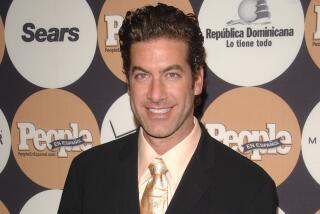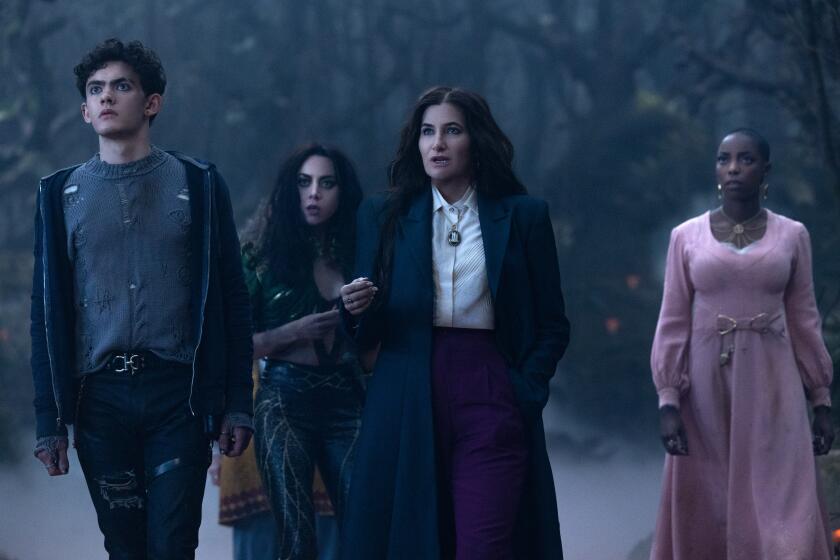Airwaves Rippling With Turmoil
It was the best of times, it was the worst of times.
A tale of two cities? Yes, partly. But this is also a tale of two radio stations--one blossoming, one struggling--and a radio network that could go either way.
The blossoming one would be North Hollywood’s KPFK-FM (90.7), which is experiencing perhaps the best year in its history, according to general manager Mark Schubb. Audience shares and financial contributions are up and the station’s physical plant has undergone a $200,000 refurbishment that featured the replacement of outdated production equipment.
The struggling one is Berkeley’s KPFA-FM, the flagship of the listener-funded Pacifica network and the nation’s oldest public radio station. KPFA’s latest forced march to the brink of collapse began five months ago when Pacifica’s governing foundation failed to renew the contract of Nicole Sawaya, the Berkeley affiliate’s popular station manager, bringing long-simmering tensions to a full boil and igniting an ugly confrontation that ended with staff members being locked out of their studios.
But what essentially began as a local dispute in Berkeley was soon being felt in North Hollywood. That’s because the two Pacifica stations are united by more than just phone lines and a left-of-center political philosophy--they also share the same management board, at least 2 1/2 hours of network programming each day and a long-term future that now appears uncertain.
“The whole network is in terrible trouble if KPFA goes under,” Schubb warns. “If one of the biggest stations in the network goes under, kiss the national programming goodbye.”
Not to mention what has traditionally been the Pacifica budget’s greatest source of listener contributions and the most energetic and enthusiastic supporters of the network’s programming.
“People have a lot of passion for it. That’s a good thing,” Schubb says. “Everybody brings this passion for the mission. But everyone sees the mission through a different lens.”
While the Sawaya firing put the match to the powder keg, the real issues behind the current dispute are conflicting models for the future of Pacifica and its five stations in New York, Washington, Houston, North Hollywood and Berkeley. On one side are Schubb and the nonprofit Pacifica Foundation’s volunteer board, who believe the network cannot survive unless it grows its audience by “professionalizing” programming and moving away from the political fringe. On the other side are longtime listeners, political activists and former programmers who charge the network with selling out by abandoning its anarchist, free-speech heritage.
And therein lies the rub. In Los Angeles, the entertainment center of the universe, KPFK has seen its audience and its budget grow as Pacifica has moved to change its programming and improve its signal. But in Berkeley, the birthplace of the free-speech movement, the network’s new sound has provoked charges of sellout, duplicity and conspiracy.
“The Pacifica network is crashing and burning in Berkeley and I think that momentum could come south,” Gil Contreras, a former KPFK news reporter and talk-show host, said in a statement posted on the Internet. “What’s happening here is appalling, the cronyism is incredible. I think the only thing that will make a difference is to hit KPFK in the pocketbook. . . .
“Until that happens, however, you can expect to see what was once one of the premiere alternative media outlets in the country move even closer to looking and sounding like their corporate counterparts.”
Pacifica was founded in 1949 by Lewis Hill, a conscientious objector and pacifist who believed radio could promote dialogue as a tool in conflict resolution. However, with the dawn of the McCarthy era, KPFA’s on-air staff saw its mission as offering a free-speech platform for dissenting voices rather than providing a place for peaceful debate. And the infighting that grew out of those differing visions laid the foundation for staff revolts and lockouts that have come to define the network.
Still, KPFA and its Los Angeles affiliate--which went on the air in 1959--have always offered a progressive spin on the news of the day, boldly airing speeches by Argentine revolutionary Che Guevara and communiques by the Symbionese Liberation Army, the Weather Underground and other radical groups.
While it was important programming you couldn’t hear anywhere else, the free-flow schedule hampered efforts to draw loyal listeners, argued Schubb, a former actor and labor activist who helped create Jim Hightower’s nationally syndicated talk show for ABC Radio prior to joining KPFK in 1995. And poor production values made it difficult to retain those who did tune in, which is why KPFK has long ranked fifth in terms of listenership among Los Angeles’ five major public-radio broadcasters.
“It’s too competitive a market now to expect people to have to reach over to the radio and be their own engineer and turn up the volume on one news story and down on another,” says Schubb, 43. “There were times when you could turn on the KPFK evening news and know it was the KPFK evening news because . . . [of] the bad cassette, the bad tape sound.
“It’s got a certain charm, but at the same time, if you’re in your car, you literally can’t hear it. We’ve got to be competitive; it’s got to be modern quality.
“The real issue is, can everybody just have this to be their own toy to do whatever the hell they want with? Or should we be on a mission and think about what we’re doing and be purposeful?” Schubb says. “There are a lot of angry demagogues who denounce editorial control or editorial process as if we’re censoring people when we try to guide where programming’s going. But there is very little real discussion about ‘Was the show good? Did people listen to the show? Do people support the show?’ ”
Recent evidence suggests they are starting to. KPFK’s cumulative weekly audience is up to 175,300, for example, and its average quarter-hour listenership has almost quadrupled since 1995. The station’s financial health has also improved: The amount of money listeners have pledged in support has nearly doubled in the last four years, despite the fact Schubb has actually shortened KPFK’s pledge drives by 15 days a year. The figures are still small compared to most other stations in the market, but it’s an amazing turnaround for an outlet that, 15 years ago, was so deep in debt it had to suspend broadcasting for 10 days.
But that alone won’t be enough to keep Pacifica vibrant. Although KPFA announcers returned to the Berkeley air last week, it remains an uneasy truce and a state legislative committee announced plans a hearing on the dispute on Aug. 20.
It seems ironic that a network that has survived decades of scrutiny by the FBI, the Justice Department and various political opponents could eventually be done in by its political allies. Although the signals of Pacifica’s five stations cover 22% of the country, the network has just 1 million listeners and less than 100,000 financial supporters--figures that continue to decline as the current crisis drags on.
“I get frustrated as hell about the infighting when we should be working together,” Schubb says. “There’s kind of some conventional accepted [wisdom] among some listeners that KPFK is supposed to be this politically pure little left-wing spot on the dial. But I don’t think most listeners want that. And to the extent that we’re trying to change our air . . . we’re trying to mix it up and bring in more voices.
“Progressive viewpoints, if they’re worth a damn, ought to at least hold the test of arguing with somebody who’s less progressive.”
More to Read
The biggest entertainment stories
Get our big stories about Hollywood, film, television, music, arts, culture and more right in your inbox as soon as they publish.
You may occasionally receive promotional content from the Los Angeles Times.











